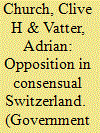| Srl | Item |
| 1 |
ID:
113137


|
|
|
|
|
| Publication |
2012.
|
| Summary/Abstract |
Are citizens in consensus democracies with developed direct democratic institutions more satisfied with their political system than those in majoritarian democracies? In this article, individual-level data from the second wave of the Comparative Study of Electoral Systems and an updated version of Lijphart's multivariate measure of consensus and majoritarian democracy covering 24 countries are used to investigate this question. The findings from logistic multilevel models indicate that consensual cabinet types and direct democratic institutions are associated with higher levels of citizens' satisfaction with democracy. Furthermore, consensus democracy in these institutions closes the gap in satisfaction with democracy between losers and winners of elections by both comforting losers and reducing the satisfaction of winners. Simultaneously, consensus democracy in terms of electoral rules, the executive-legislative power balance, interest groups and the party system reduces the satisfaction of election winners, but does not enhance that of losers.
|
|
|
|
|
|
|
|
|
|
|
|
|
|
|
|
| 2 |
ID:
091113


|
|
|
|
|
| Publication |
2009.
|
| Summary/Abstract |
Although conventional wisdom sees Switzerland as oppositionless, in December 2007 its biggest party, the Swiss People's Party (SVP), declared itself in 'opposition'. It implied this was something dramatic but implementation was hesitant, degenerating into personalized attacks on the minister elected over its party leader. This led to splits in the party and the strategy petered out, with the SVP returning to collegial government, consensus having proved too strong. Although political science has recently neglected opposition, the SVP's understanding of the concept was distant from most ideas of 'opposition politics', notably Anglo-Saxon practices. The experiment is therefore best understood as a rhetorical flourish, arising out of the SVP's powerful, but unusual, populism. Though unsuccessful, it shows Swiss politics are changing and the populist challenge remains.
|
|
|
|
|
|
|
|
|
|
|
|
|
|
|
|